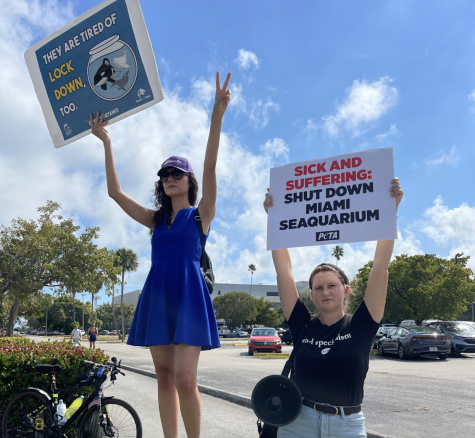Activists at the Forefront of the Fight for Lolita’s Freedom
May 24, 2022
Throughout the last 52 years, the ethical debate of keeping orcas captive in tanks across the United States arose. Many pointed out that these intelligent marine mammals had originally been kidnapped from their pods and sold into captivity, with many orcas being slaughtered in the process of the capture. Throughout the course of several decades, the debate continues to rage onward today. Recently, the story of Lolita, the last living Southern Resident killer whale in captivity, has been at the center of that debate.
‚ÄúActivists are here protesting today for Lolita, the orca who has been held in the world’s smallest orca tank for over 50 years at Miami Seaquarium. We‚Äôve just learned recently that she‚Äôs possibly deathly ill with pneumonia,‚Äù explained one out of the many protesters standing outside the parking lot to the Seaquarium in February, hoping to convince potential visitors to turn away. At the time of the protest, Lolita was being treated for a mystery illness. Several unidentified sources claimed that Lolita was suffering from pneumonia.

‚Äú[The Seaquarium doesn’t] care about the animals, they only care about profit,” accused the protester.
Local activists arrive to protest the Seaquarium every Sunday from twelve to two. According to this protester, they’ve “only seen the numbers continue to grow for Lolita.”
Many of the local activists had organized either through PETA’s action team or South Florida based animal rights groups on Facebook. The action team was responsible for many of the pamphlets and posters being distributed in the area.
‚ÄúIt‚Äôs clear that the people of Miami are ready to see the animals suffering at Miami Seaquarium liberated. We‚Äôve gotten dozens of cars to turn around just today because people are realizing that there‚Äôs nothing educational or humane about keeping these very complex intelligent animals in tiny tanks,” added another protester.
Howard Garrett has been the president of Orca Network since forming the organization in 1995. As a researcher and an activist, Garrett has been working with orcas for over 30 years. For many of those years, much of Garrett’s interest has lay regarding Lolita, or Tokitae (meaning nice day, pretty colors) as she was originally named in her native home of the southern Salish Sea.
“I went to Miami and saw her. I’ve grown more respectful of her abilities and courage to stay alive all these years. Lolita has an incredible resilience and some deep resources of strength. I’ve come to appreciate that she is hanging on for some reason.” Garrett explained, recounting his own personal history with Lolita.
‚ÄúIt‚Äôs illegal. It‚Äôs a tiny tank that violates the animal welfare act in many ways. It‚Äôs miserable for her to be there 24/7. It‚Äôs the kind of torture that‚Äôs comparable to solitary confinement. She needs to come home. Twenty years ago, they admitted that they would have to build a new tank, but they never did,‚Äù Garret highlighted much of the abuse that Tokitae has faced, referencing the Seaquarium’s previous unfulfilled promise to build a new tank. However, he is hopeful for the future Tokitae could have.
As explained by Garret, in 2017, the Lummi tribe brought a completely different viewpoint to the table. The tribe passed a resolution explaining their dedication to bringing Lolita back, a sacred being they consider more akin to family.
‚Äú[The tribe] was thinking of Lolita as family, considering [their] 10,000 year plus history of being on the water. The tribes up here went everywhere by canoe, going 20 miles across the ocean to travel from island to island,” said Garrett.

The Lummi People are the native inhabitants of Washington’s northernmost coast and southern British Columbia.¬Ý Notably, they are known for their efforts to defend the environment and places considered sacred to them. Historically, many of the Lummi People established villages near the sea while moving according to the seasons.¬Ý
‚ÄúThe ancestors of southern resident orcas had been here first. They would meet the¬Ýnatives and build up deep relationships as they‚Äôd see each other over and over for lifetimes. Lolita is like family to them. She‚Äôs their heritage. Their name for orcas is ‚Äúqw’e lh’ol’ me chen,‚Äù meaning ‘our relations who live under the water,'” explained Garrett.
The main argument for Tokitae resides in the desire of many advocacy groups to return her to a sea pen rehabilitation center, where she can rebuild her strength and stamina: something more akin to the environment she would have enjoyed when she was a calf- and less so to her home now, a space that is twenty feet deep at its deepest and at its longest is simply four times the length of her body. In fact, Tokitae’s tank is considered the smallest orca tank in the world.
‚ÄúShe has her own mind, her own creativity. Even to this day I can‚Äôt see any sign of mental deterioration. She’s got a sense of who she is. In other caged animals, we see them pace endlessly or sink into a corner and never want to come out. She‚Äôs still very active and responsive to affection- a kind voice, it‚Äôs a tone of voice that she‚Äôll recognize,‚Äù said Garrett.
Garrett emphasizes what he perceived to be Tokitae’s gentle nature; the orca has never been known to hurt or attack any humans.
‚ÄúI want people to understand that she has a mind of her own. Lolita has a very special intelligence that we don‚Äôt understand but it gives her great strength. People have to focus on her capabilities to understand why she is fully capable of coming home,” summarized Garrett.